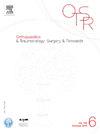基于虚拟现实的模拟提高肩袖修复技能:随机转移有效性研究。
IF 2.3
3区 医学
Q2 ORTHOPEDICS
引用次数: 0
摘要
背景:尽管虚拟现实(VR)模拟器在医护专业人员的基本技术技能培训方面已经证明了其高效性,但对于更复杂和连续的手术,尤其是关节镜手术,仍需进行验证。我们假设,将基于 VR 的模拟训练转移到逼真的视觉和触觉条件下,可提高关节镜袖带修复技能:研究设计:本研究为前瞻性、多中心和随机研究:方法:30 名骨科住院医师参加了研究,并随机分为两组:VR培训组(VR+)和无VR培训组(VR-)。只有VR+组每月接受一次基于VR的肩袖修复训练。为期 1 小时的 VR 训练课程是标准化的,并由同一名教师进行指导。6 个月后,所有参与者都在台式肩关节模型上进行了双排肩袖关节镜修复术,该模型提供了逼真的视觉和触觉条件,并植入了植入物。两名在肩关节修复方面具有专长的独立外科医生使用关节镜手术技能评估工具(ASSET)对参与者的表现进行评分,他们对随机化结果置盲:两组参与者的人口统计学特征和手术经验相当。VR + 组的 ASSET 综合评分高于 VR- 组(分别为 34.4 ± 3.1 分和 30.5 ± 5.7 分;P = 0.046),VR + 组的手术速度快于 VR- 组(分别为 27.3 ± 3.6 分和 31.7 ± 0.4 分;P = 0.003):本研究表明,在使用有效的 ASSET 评分标准掌握复杂和连续的肩袖修复术方面,为期 6 个月的每月 VR 课程优于单独的标准同伴培训。总体而言,VR + 组的非特异性关节镜技能也更高:证据级别:II,治疗性研究。本文章由计算机程序翻译,如有差异,请以英文原文为准。
Virtual reality-based simulation improves rotator cuff repair skill: A randomized transfer validity study
Background
Although virtual reality (VR) simulators have demonstrated their efficiency for basic technical skill training of healthcare professionals, validation for more complex and sequential procedures, especially in arthroscopic surgery, is still warranted. We hypothesized that the VR-based training simulation improves arthroscopic cuff repair skills when transferred to realistic visual and haptic conditions.
Hypothesis
VR-based training simulation improves arthroscopic cuff repair skills when transferred to realistic visual and haptic conditions.
Study design
This study is prospective, multicentric and randomized.
Methods
Thirty orthopedic surgery residents were enrolled in the study and randomized in two groups: VR training (VR+) and no VR training (VR−). Only the VR+ group underwent a monthly VR-based training program for rotator cuff repair. The 1-h VR training sessions were standardized and supervised by the same instructor. After six months, all participants performed a double-row arthroscopic rotator cuff repair procedure on a benchtop shoulder model providing realistic visual and haptic conditions with implants. Two independent surgeons with expertise in shoulder repair and blinded to the randomization rated the participants' performance using the Arthroscopic Surgical Skill Evaluation Tool (ASSET).
Results
Demographic characteristics and surgical experience were comparable between the two groups. The ASSET global rating score was higher in the VR+ group than in the VR- group (34.4 ± 3.1 and 30.5 ± 5.7, respectively; p = 0.046) and the VR+ group performed the procedure faster than the VR- group (27.3 ± 3.6 vs. 31.7 ± 0.4 min, respectively; p = 0.003).
Discussion
This study demonstrated that a monthly VR-based program for 6 months was better than standard peer training alone for mastering a complex and sequential rotator cuff repair when using the validated ASSET Score. Overall, nonspecific arthroscopic skills were also higher in the VR+ group.
Level of evidence
II, therapeutic study.
求助全文
通过发布文献求助,成功后即可免费获取论文全文。
去求助
来源期刊
CiteScore
5.10
自引率
26.10%
发文量
329
审稿时长
12.5 weeks
期刊介绍:
Orthopaedics & Traumatology: Surgery & Research (OTSR) publishes original scientific work in English related to all domains of orthopaedics. Original articles, Reviews, Technical notes and Concise follow-up of a former OTSR study are published in English in electronic form only and indexed in the main international databases.

 求助内容:
求助内容: 应助结果提醒方式:
应助结果提醒方式:


